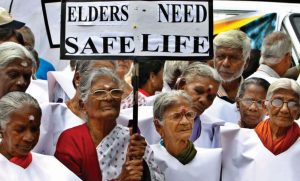 June 15 is celebrated as the World Elder Abuse Awareness Day. Old age comes without any effort yet abuse in it manifests in myriad forms such as physical abuse, neglect, verbal assault, material abuse and violation of rights. Abuse has often been described as an intentional action that cause harm or risk of harm, such as a care-giver’s failure to satisfy the basic needs and safe living conditions of the elderly. Emotional and economic dependence on the abusers is the main cause of abusing.
June 15 is celebrated as the World Elder Abuse Awareness Day. Old age comes without any effort yet abuse in it manifests in myriad forms such as physical abuse, neglect, verbal assault, material abuse and violation of rights. Abuse has often been described as an intentional action that cause harm or risk of harm, such as a care-giver’s failure to satisfy the basic needs and safe living conditions of the elderly. Emotional and economic dependence on the abusers is the main cause of abusing.
Due to patriarchal joint families in the past, elders were given high respect and their decisions were binding on the family members. Elders were independent and the whole family dovetailed around them. However, in modern times, the structure of the family has changed. Erosion of values, apathetic attitude of society, financial crises and health-related issues of elders are some of the causes leading to such abuse. Due to weakening of family bonds the elders have no choice but to live alone. Since they are forced to live alone, they also become victims of crime against them.
The elderly who have some source of income, such as property, pension, savings, income from business, etc., i.e. economic independence, have a say in family matters and face fewer problems. On the other hand, those who are largely economically and socially dependent on their children face more problems as children do not receive economic returns in exchange for the care provided to elders. The significant part of elders is social interaction, as it is a measure of density of interactions with involvement with other human beings.
Simply making provisions of food, shelter and health care facilities is not sufficient, as elders require more than that. The elderly need love and care just like the children do. No wonder the history repeats itself, those who received love and care in their infancy and childhood are expected to return it in their youth to those from whom they received it. Bhuvan, my illustrious nephew, depicts a child’s nostalgia about mother’s womb in his meaningful painting.
In old age, the elderly are more dependent on family members but receive less attention from them. Old age needs love and support, but if it is neglected, the old one feels very sad and bad and the elderly woman generally feels the same in the family. The psycho-social process of growing older has vital social and cultural dimensions which affect what is observed as purely biological inevitability. The elderly are seen as non-productive and a burden to the family and society. Loneliness is a big problem and becomes serious if one of the spouses has died.
The normal aging process inheres in itself various well known afflictions, inter alia, auto immune diseases, circulatory, respiratory, auditory, olfactory, locomotion, neurological problems, instability, incontinence, constipation, osteoporosis etc. All such afflictions if present alone or in co-morbid form can result in chronic low health status, low food intakes, thus greatly complicating diagnosis and treatment.
To ensure a safe and happy life for elderly people, the government is trying to intervene at various levels, like old age pensions etc. to make the elderly economically independent. However, there is lack of awareness about the redress mechanism in legal provisions for the incidences of elderly abuse. To overcome the problem a law, the “Maintenance and Welfare of Parents and Senior Citizens Act”, was passed in 2007.
Tribunals in every district of the country have been set up to dispose off the cases filed before them expeditiously. Most of the elderly do not want to take legal measures for fear of losing family pride and care of family members. Those who either in sheer desperation or otherwise being left with no other option, do file cases, face an arduous time and money wastage drill with dismal outcomes. Those with little or no source of income, continue to reside with their families and face abuse. Thus the ritual of celebrating elderly abuse awareness day goes on merrily.
letters@tehelka.com













